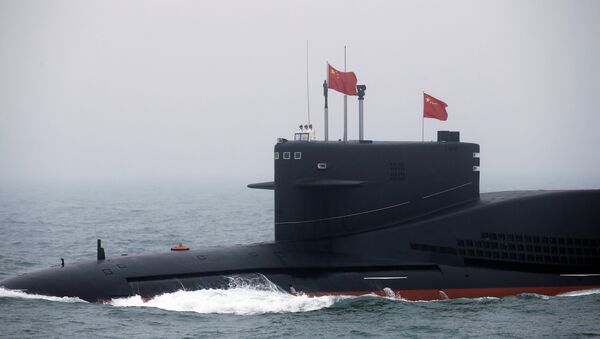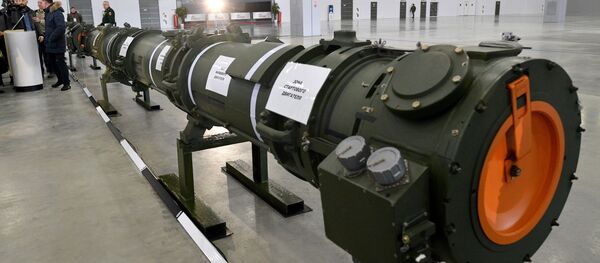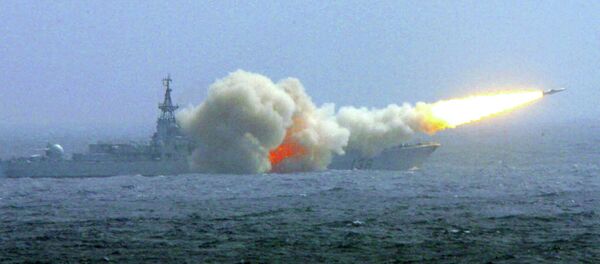Before and after the withdrawal from the 1987 US-Soviet Intermediate-Range Nuclear Forces (INF) Treaty in February, Washington has repeatedly voiced its intentions to expand nuclear arms reduction talks to China.
READ MORE: Trump ‘Would Be More Than Happy’ to Kill New START – Think Tank
Most recently, on Friday, US President Donald Trump told reporters that he would soon launch bilateral talks with Russia on a new nuclear arms control deal that could see both sides reduce their arsenals, adding that the negotiations could eventually be expanded to include China. Beijing responded to the suggestion by saying that it had no intention to join any talks.
Different Weight Class
China’s reluctance to join talks on a possible trilateral nuclear agreement might stem from the differences in the scales of the three countries' nuclear arsenals, Joshua Pollack, a senior research associate at the Middlebury Institute of International Studies and an expert on nuclear and missile proliferation, told Sputnik.
"Beijing's position on nuclear arms control has been consistent over the years: they have no plans to get involved until Russian and American arsenals have come down to similar scales as their own", Pollack said.
READ MORE: NATO Discusses Measures if Russia Violates INF Treaty — Stoltenberg
"China simply does not have a sufficient number of long-range strategic ICBMs [intercontinental ballistic missiles] to consider eliminating its stockpile of INF-range missiles", Thakur noted.
No Political Appetite
Even though the United States has expressed its readiness for arms control talks, it appears that Washington is not really willing to reduce its nuclear arsenal and engage in actual negotiations, former UN High Representative for Disarmament Affairs Angela Kane told Sputnik.
READ MORE: US Gen. Sheds Light on Plans to Deploy Cruise Missiles in Europe Amid INF Exit
"I think — because of Trump’s policy of extending the nuclear arsenal, of expanding the possible first use of nuclear weapons — that there is not much of willingness to enter into negotiations on nuclear weapons at all, whether it is with the Russian Federation or with any other nuclear power", Kane said.
She noted that Russia, on the other hand, was willing to continue arms control negotiations.
Pollack stressed, in turn, that extending the New START agreement would be much easier than starting arms control talks "from a blank page", but agreed that Trump was unlikely "to care for the idea".
"Anything done by his predecessors, in [Trump’s] own view, is unworthy. This attitude might explain why he now insists on a Chinese role — it looks like a way of portraying bilateral nuclear arms control as inadequate", the expert explained.
Kane noted that there was a need for a multilateral approach that would include not only China, Russia and the United States, but other nuclear powers, including France, the United Kingdom, as well as Israel, India, Pakistan and North Korea that are not parties to the 1968 Nuclear Non-Proliferation Treaty (NPT).
READ MORE: Russia, US Could Maintain Legal INF Status Even After Treaty Ends — Scholar
She added, however, that there was little chance that they would be forced by the rest of the international community to enter such negotiations.
"There is no political will to engage in actual nuclear reduction agreements or negotiations. There is no talk, there is no confidence-building measures that can possibly end up in this area. To my mind, there are viable multilateral nuclear agreements, but there is no political appetite to enter into this", she stressed.
Thakur echoed Kane’s calls for a larger and broader engagement of the nine nuclear powers in arms control talks.
Trump in February announced that the United States would withdraw from the INF Treaty, which was signed by Soviet leader Mikhail Gorbachev and US President Ronald Reagan in 1987. Following Trump's announcement, Russia also suspended its obligations under the INF Treaty.
READ MORE: Trump Administration Interested in Extending New START Treaty — Undersecretary
Another bilateral agreement in question is the New START. The accord went into force in 2011 and covers a 10-year period with the possibility of a five-year extension. The agreement limits the number of deployed intercontinental ballistic missiles, submarine-launched ballistic missiles, nuclear armed bombers, and nuclear warheads.
Views and opinions expressed in this article are those of the speakers and do not necessarily reflect those of Sputnik.






